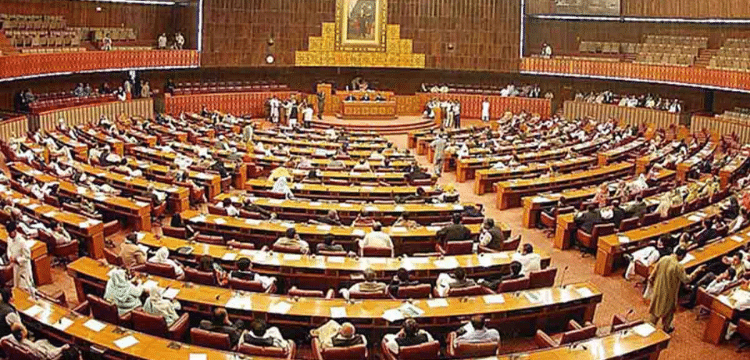[vc_row][vc_column][vc_column_text dp_text_size=”size-4″]ISLAMABAD: The government introduced a bill in the National Assembly on Wednesday to further amend the country’s accountability law, with the goal of empowering the head of the country’s top anti-graft body.
The move came after an interim official report in February revealed that, as part of an IMF-mandated review of Pakistan’s anti-corruption framework, the government agreed to amend the National Accountability Ordinance and the Federal Investigation Act.
The report was submitted to the IMF as part of the global lender’s condition that a taskforce conduct a comprehensive review of Pakistan’s anti-graft institutional framework.
According to the interim report, the taskforce has recommended changes to the NAO of 1999 and the FIA Act of 1974. The IMF imposed the condition last year after the government made changes to the NAO that benefited both politicians and bureaucrats.
Also Read: Govt to submit another resolution in NA against SC rulling
Azam Nazeer Tarar, Minister of Law and Justice, introduced the National Accountability (Amendment) Bill, 2023, which seeks to amend 17 sections of the original law.
The amendments would apply to the 1999 National Accountability Ordinance (NAO).
The proposed bill would give the chairperson of the National Accountability Bureau (NAB) more authority.
The NAB chief shall consider all pending inquiries intended to be transferred under subsection 3.
The proposed amendments give the NAB chairperson the authority to close any other law-related inquiries.
All such inquiries shall be referred to the relevant agency, institution, or authority by the chief of the anti-graft body.
If the NAB is not satisfied with the investigation, its chief will be authorised to refer the case to the appropriate court for approval of the suspect’s release.
Also Read: Nawaz demands reference against SC judges after Punjab poll verdict
Following receipt of the inquiry from the NAB chief, the concerned agency, authority, or department will be authorised to conduct additional investigations under clauses A and B.
If the court is not satisfied, any case can be referred back to the relevant institutions, agencies, or authorities with the assistance of NAB.
When a case is returned from court, NAB will be able to prosecute it under its own rules through the relevant department or authority.
Cases decided prior to the National Accountability Amendment Acts of 2022 and 2023 will be upheld.
These decisions will be in effect until they are revoked.
Under its respective laws, any court forum or agency may record or re-record old or new witnesses for further proceedings in a case referred to it.
Section 5 of the NAB Act states that all pending inquiries, investigations, and trials must follow the rules of the institutions involved.
In the event of the NAB chief’s absence or inability to perform their duties for any reason, their deputy will be authorised to assume their responsibilities.
If the deputy chairperson is unable to serve, the federal government will be authorised to appoint the acting NAB chief from among the anti-graft body’s senior officers.
A joint sitting of parliament passed the NAB (Second Amendment) Bill 2021 in June of last year.
It delegated NAB’s authority to act on federal, provincial, or local tax issues. Regulatory bodies were also removed from the domain of the anti-graft body.
President Arif Alvi returned the bill unsigned before it became law.
The PTI filed an appeal with the Supreme Court against the bill, arguing that the amendments would allow public officials to go unpunished for white-collar crimes.
Just a month later, in July 2022, the federal cabinet passed the National Accountability (Third Amendment) Bill, 2022, which included new legislation limiting the NAB’s role in graft cases involving more than Rs500 million and removing the president’s power to appoint accountability court judges.[/vc_column_text][/vc_column][/vc_row]











